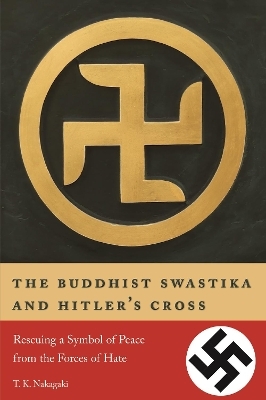
The Buddhist Swastika and Hitler's Cross
Stone Bridge Press (Verlag)
978-1-61172-045-7 (ISBN)
A remarkable cross-cultural history that rescues the swastika, an
ancient Buddhist symbol, from its deployment by the forces of hate.
The swastika has been used for over three thousand years by billions
of people in many cultures and religions—including Buddhism, Jainism and Hinduism—as an auspicious symbol of the sun and good fortune. However,
beginning with its hijacking and misappropriation by Nazi Germany, it
has also been used, and continues to be used, as a symbol of hate in the Western World. Hitler's device is in fact a "hooked cross."
Rev. Nakagaki's book explains how and why these symbols got confused, and
offers a path to peace, understanding, and reconciliation.
Please note: Photographs in the digital edition of the books are in color.
Photographs in the print edition are in black and white.
Rev. Dr. T. K. Nakagaki is a Buddhist priest, ordained in the 750-year- old Jodoshinshu tradition of Japanese Buddhism. He is the author of three books in Japanese, A New York Buddhist Priest Walks in India (Gendai Shokan, 2003); Diary of a Manhattan Monk (Gendai Shokan, 2010); and Manji and Hakenkreuz (Gendaishokan, 2013). He is also a noted Japanese calligrapher.
ACKNOWLEDGEMENTS vii
Preface 1
Western vs. Eastern Perceptions of the Swastika
A Few Notes on Terms and Images 3
My First Encounter in the US ... 4
Why Discuss the Swastika Now? 6
The Human Capacity for Atrocity 8
Encountering Holocaust Survivors 10
Importance of Dialogue 12
Our Own Monsters Within 13
Chapter 1 14
The Swastika Symbol in My Tradition
The Swastika in Japan 14
Meaning of the Swastika in Japanese language 26
Meaning of the Swastika in the Buddha’s Discourse 29
The Standard Buddhist Swastika is Left-Turning 35
Chapter 2 39 A Universal Symbol
Swastika Use in Various Religions 40
The Swastika Symbol in North America 56
Chapter 3 69 Hitler’s Flag
Design of the Hook-Cross 69
Hitler and the Eastern Swastika; 74
Swastika usage in 19th and 20th Century Europe 74
Chapter 4 77 Hitler’s First Meaning of Hakenkreuz: Aryan
Meaning of “Aryan” 77
Ārya in Buddhism 78
The Western Concept of What is an Aryan 82
The Meaning of “Aryan” for Hitler 87
Chapter 5 96 Hitler’s Second Meaning of The Hakenkreuz : Anti-Semitism
Meaning of Anti-Semitism 96
Anti-Semitism and Hitler’s Early Life 99
Martin Luther (1483 -1546) 100
Richard Wagner (1813 -1883) 107
Luther, Wagner and Hitler 117
Political Symbol vs. Religious and Spiritual Symbol 117
Chapter 6 119 Hitler’s Symbol Is a “Hakenkreuz,” Not a Swastika
Difference between “Swastika” and “Hakenkreuz” 119
Definition of “Hakenkreuz” 125
Swastika and Hakenkreuz in Dictionaries 127
Translation Problems of “Hakenkreuz” 131
Chapter 7 140 Conclusion – Present & Future Meaning of the Swastika Symbol
Current Swastika Issues 140
Where Are We Going? 143
Epilogue 147
Action Plan for the Public
BIBLIOGRAPHY 152
| Erscheinungsdatum | 15.09.2018 |
|---|---|
| Zusatzinfo | B&W photos throughout |
| Verlagsort | Berkeley CA |
| Sprache | englisch |
| Maße | 152 x 228 mm |
| Themenwelt | Kunst / Musik / Theater |
| Geisteswissenschaften ► Religion / Theologie ► Buddhismus | |
| ISBN-10 | 1-61172-045-1 / 1611720451 |
| ISBN-13 | 978-1-61172-045-7 / 9781611720457 |
| Zustand | Neuware |
| Haben Sie eine Frage zum Produkt? |
aus dem Bereich


